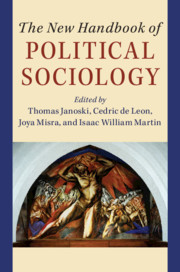Book contents
- The New Handbook of Political Sociology
- The New Handbook of Political Sociology
- Copyright page
- Dedication
- Contents
- Tables
- Figures
- Contributors
- Acknowledgments
- Introduction
- I Theories of Political Sociology
- II Media Explosion, Knowledge as Power, and Demographic Reversals
- III The State and Its Political Organizations
- IV Civil Society: The Roots and Processes of Political Action
- V Established and New State Policies and Innovations
- 30 The Evolution of Fiscal and Monetary Policy
- 31 Welfare State Policies and Their Effects
- 32 Sexuality, Gender, and Social Policy
- 33 Migration, Asylum, Integration, and Citizenship Policy
- 34 Cosmopolitanism and Political Sociology
- 35 War, States, and Political Sociology
- VI Globalization and New and Bigger Sources of Power and Resistance
- Index
- References
35 - War, States, and Political Sociology
Contributions and Challenges
from V - Established and New State Policies and Innovations
Published online by Cambridge University Press: 22 February 2020
- The New Handbook of Political Sociology
- The New Handbook of Political Sociology
- Copyright page
- Dedication
- Contents
- Tables
- Figures
- Contributors
- Acknowledgments
- Introduction
- I Theories of Political Sociology
- II Media Explosion, Knowledge as Power, and Demographic Reversals
- III The State and Its Political Organizations
- IV Civil Society: The Roots and Processes of Political Action
- V Established and New State Policies and Innovations
- 30 The Evolution of Fiscal and Monetary Policy
- 31 Welfare State Policies and Their Effects
- 32 Sexuality, Gender, and Social Policy
- 33 Migration, Asylum, Integration, and Citizenship Policy
- 34 Cosmopolitanism and Political Sociology
- 35 War, States, and Political Sociology
- VI Globalization and New and Bigger Sources of Power and Resistance
- Index
- References
Summary
States were the quintessential containers of modernity (Giddens 1985). Although states never completely contained “their” society (Held 1996: 350–351), states did carve up (with modest exceptions) the entire planet into mutually exclusive geographic areas, and within “their” domain, states exerted institutionalized and legitimate power. Over the course of the nineteenth and twentieth centuries, states penetrated society in unprecedented ways and took on an expanding role in coordinating educational, medical, infrastructural, and social welfare services (Mann 1993, 2012). Bauman makes the case that with globalization giving rise to liquid modernity, the stability and power of the state no longer depend on direct control of society and its institutions.
- Type
- Chapter
- Information
- The New Handbook of Political Sociology , pp. 924 - 950Publisher: Cambridge University PressPrint publication year: 2020
References
- 2
- Cited by



